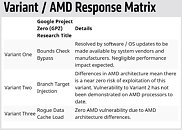- Joined
- Oct 9, 2007
- Messages
- 47,853 (7.38/day)
- Location
- Dublin, Ireland
| System Name | RBMK-1000 |
|---|---|
| Processor | AMD Ryzen 7 5700G |
| Motherboard | Gigabyte B550 AORUS Elite V2 |
| Cooling | DeepCool Gammax L240 V2 |
| Memory | 2x 16GB DDR4-3200 |
| Video Card(s) | Galax RTX 4070 Ti EX |
| Storage | Samsung 990 1TB |
| Display(s) | BenQ 1440p 60 Hz 27-inch |
| Case | Corsair Carbide 100R |
| Audio Device(s) | ASUS SupremeFX S1220A |
| Power Supply | Cooler Master MWE Gold 650W |
| Mouse | ASUS ROG Strix Impact |
| Keyboard | Gamdias Hermes E2 |
| Software | Windows 11 Pro |
There has been recent press coverage regarding a potential security issue related to modern microprocessors and speculative execution. Information security is a priority at AMD, and our security architects follow the technology ecosystem closely for new threats. It is important to understand how the speculative execution vulnerability described in the research relates to AMD products, but please keep in mind the following: 
When AMD learned that researchers had discovered a new CPU attack targeting the speculative execution functionality used by multiple chip companies' products, we immediately engaged across the ecosystem to address the teams' findings. The research team identified three variants within the speculative execution research. The below grid details the specific variants detailed in the research and the AMD response details (above).
As the security landscape continues to evolve, a collaborative effort of information sharing in the industry represents the strongest defense.
Total protection from all possible attacks remains an elusive goal and this latest example shows how effective industry collaboration can be.
As always, AMD strongly encourages its customers to consistently undertake safe computing practices, examples of which include: not clicking on unrecognized hyperlinks, following strong password protocols, using secure networks, and accepting regular software updates.
View at TechPowerUp Main Site
- The research described was performed in a controlled, dedicated lab environment by a highly knowledgeable team with detailed, non-public information about the processors targeted.
- The described threat has not been seen in the public domain.

When AMD learned that researchers had discovered a new CPU attack targeting the speculative execution functionality used by multiple chip companies' products, we immediately engaged across the ecosystem to address the teams' findings. The research team identified three variants within the speculative execution research. The below grid details the specific variants detailed in the research and the AMD response details (above).
As the security landscape continues to evolve, a collaborative effort of information sharing in the industry represents the strongest defense.
Total protection from all possible attacks remains an elusive goal and this latest example shows how effective industry collaboration can be.
As always, AMD strongly encourages its customers to consistently undertake safe computing practices, examples of which include: not clicking on unrecognized hyperlinks, following strong password protocols, using secure networks, and accepting regular software updates.
View at TechPowerUp Main Site



